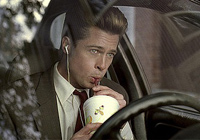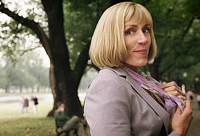“So what did we learn?” “Well I dunno!”
That exchange occurs in the final few seconds of the Coen Brothers’ latest adventure, Burn After Reading, and though it makes perfect sense in the context of the story, it’s hard not to think that it’s also a commentary on the Coens themselves, and the unusual predicament in which they’ve found themselves.
After over two decades of being renegade filmmakers, playing by their own rules and no one else’s, Joel and Ethan have finally, officially, become part of the Hollywood establishment—winning an armload of Oscars will do that to you, after all. But of course, the Coens have a subversive streak in them yet; after all, they won Best Picture for a movie—No Country for Old Men—that engaged in heady philosophical musings, only to end with an abrupt and abstract finale that left most moviegoers (and critics) a bit baffled.

Now they’ve followed that movie, in all its morbid seriousness and theological inquiry, with a movie that’s every bit as silly and irreverent as No Country was harsh and philosophical. So what have we learned? The Coens aren’t telling, and in fact, it seems as though they resent the question.
But this kind of willful difficulty—this act of sticking a big stick right in the eye of their critics and admirers alike—isn’t new for the Coens. Anyone who’s followed them even casually knows that they’ve always had a penchant for the very serious and the very silly—sometimes within the same movie, as with Fargo—and that they attack even their most frivolous comedies with the same focus and level of craft that they bring to their genre pics and their art films. Coen fans also know that that the brothers’ comedies often come directly after they achieve critical success with their dramas—and given their love for cinematic mischief, that’s probably not a coincidence.

They followed their Cannes darling Barton Fink with the zany The Hudsucker Proxy, the Oscar recognition for Fargo yielded the stoner classic The Big Lebowski, and the willfully difficult, demanding The Man Who Wasn’t There was quickly followed by the lightweight Intolerable Cruelty and a flimsy remake of The Ladykillers. That’s just the way the Coens work—they play by nobody’s rules but their own, they refuse to be put into a box, and it seems as though they’re almost incapable of following a movie as serious as No Country with anything that isn’t completely silly and absurd—which Burn After Reading is, in spades.
But thankfully, this is good Coen silliness, not forgettable Coen silliness (a la Intolerable Cruelty and The Ladykillers). Burn After Reading may not be quite as eccentric as Raising Arizona, but it comes close, and it’s certainly got enough of the beloved Coen wit and imagination to make it feel like an essential addition to their catalog of movies—in its own way, every bit as essential as No Country for Old Men.

Burn is one of their more outlandish and silly farces—a glorious send-up of CIA paranoia in particular, and the foibles of human greed and foolishness more generally. John Malkovich stars as Osborne Cox, a recently fired spy who decided to dedicate his newfound free time to writing his memoirs. Trouble is, he’s a little careless with his top-secret documents, which end up in the hands of two bumbling, buffoonish gym employees, Chad (Brad Pitt) and Linda (Frances McDormand, wife of Joel Coen). Ever ambitious—and, in Linda’s case, desperate to afford some plastic surgery so she can win a man—the two take to blackmailing Agent Cox, which, as he exasperatedly but rightly points out, puts them in way over their heads.
It’s an absurd and imaginative comedy of errors, but it’s also, well, a sex comedy—and yes, very much for grown-ups only. See, Osborne’s overbearing wife (Tilda Swinton) is involved with a man named Harry (George Clooney), who happens to be involved with Linda as well. And so, a bizarre and beguiling web of betrayal and deceit, malice, and downright stupidity, follows with a pair of CIA superiors (David Rasche and Juno‘s J.K. Simmons) trying to watch all the action, completely dumbfounded and generally speechless.

Obviously, it’s not a work of theological and philosophical questioning and taut storytelling like No Country for Old Men—although it must be said that the Coens unfold their narrative masterfully, and get the best out of their actors even in a silly farce like this. No, this is a pair of talented filmmakers cutting up and having some fun, indulging in some truly inspired silliness and bringing some fantastic actors along for the ride. It’s a strange, very funny, and oddly suspenseful movie, with plenty of big laughs (be it Clooney’s nervous twitch, Pitt’s enthusiastic dancing, or the typically sharp Coen dialogue) that ultimately escalated into some surprising and ingenious plot developments (some of which are jarringly violent—in the film’s final third, the Coens get back in touch with part of their Fargo muse).
But is there really nothing to learn? Is it just the Coens indulging in the goodwill afforded by their own celebrity? Actually, there is some wisdom to be gleaned, albeit very dark. Many have accused the Coens of being misanthropes, and that criticism will surely be thrown at them again here, but this is, in some ways, to miss the point. Yes, humanity is portrayed as being self-centered and corrupt, not to mention totally dimwitted, but that would certainly track with the biblical teaching that none are righteous, that the human heart is a factory of idols, that apart from Christ we are foolish and silly creatures? One could argue that the Coens are just being honest about the nature of man—and the wages of sin, as almost all of these characters are undone by their own folly. But even if that’s too much to swallow, there’s no denying that it’s a deliriously funny and delightful comedy for grown-ups, another exceptional movie from a creative team that seems boundlessly skilled and imaginative no matter what genre they’re working in.
Talk About It
Discussion starters- What motivates each of these characters to act the way they do? Do any of them have honorable motives? Can we learn anything from characters who behave poorly, who don’t have honorable motives?
- Do any of the characters seem to learn anything? Do any of them change?
- What attitude toward humanity does the movie seem to take? Is it a fair viewpoint?
The Family Corner
For parents to considerBurn After Reading is rated R for pervasive language, sexual content and violence. The language includes many four-letter words, as well as a few instances of the Lord’s name being misused. There are frank depictions of adulterous relationships, including some folks seen in bed together, although no explicit nudity or action is seen. There is a visual gag involving an artificial replica of male genitals, and a couple of moments of brief but jarring and bloody violence.
Photos © Copyright Focus Features
Copyright © 2008 Christianity Today. Click for reprint information.












